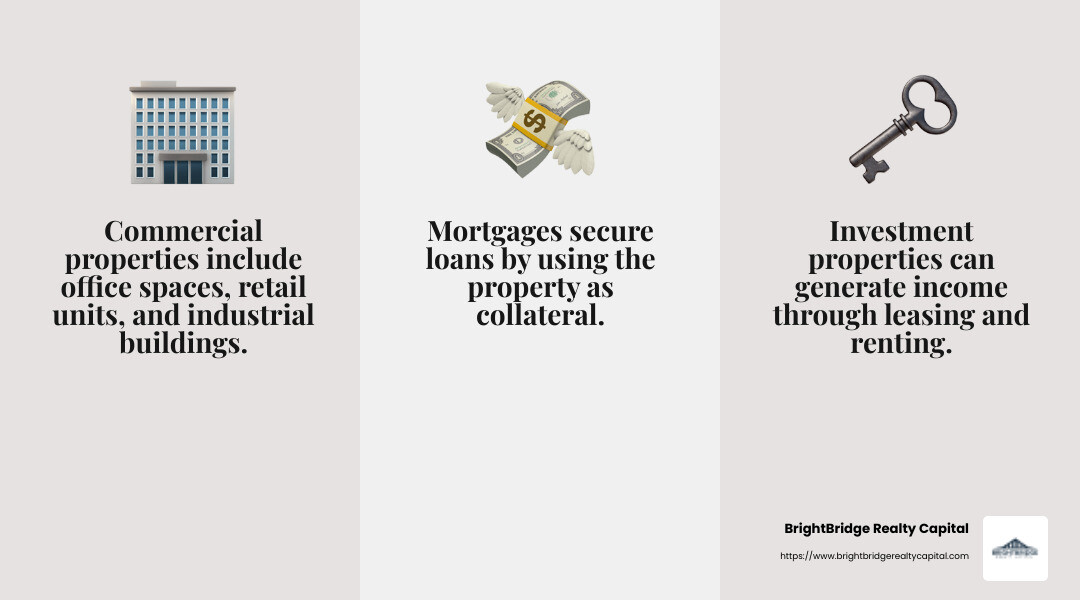Funding Your Future: Navigating Commercial Real Estate Loans

Commercial real estate funding plays a crucial role in helping investors grow their property portfolios and increase wealth. It provides the financial backbone to buy, refinance, or expand commercial properties, enabling strategic investments that can yield significant returns. Whether you're diving into a fix-and-flip project or expanding a rental portfolio, understanding the ins and outs of commercial real estate funding is key to maximizing opportunities.
Why is commercial real estate funding important?
- Enables property acquisition and development
- Supports portfolio expansion and diversification
- Offers flexibility with various financing options
- Provides access to competitive interest rates
For real estate investors, having a solid investment strategy isn't just about picking the right property; it's about securing the right financing. By leveraging commercial real estate loans, investors can ensure quick, smooth, and cost-effective transactions, essential for capitalizing on today’s dynamic real estate market.

Commercial real estate funding terms made easy:
Understanding Commercial Real Estate Funding
Commercial real estate funding is the engine that powers property investments. It provides the necessary capital to acquire, develop, or refinance commercial properties. This type of funding is not only about securing a loan but also involves understanding the different types of loans available, the role of mortgages, and how they relate to investment properties.
What Exactly is a Commercial Real Estate Loan?
A commercial real estate loan is a financial product designed for purchasing, developing, or refinancing commercial properties. Unlike residential loans, these loans often have shorter terms and may require larger down payments. They can be used for various property types, including office spaces, retail centers, industrial buildings, and more.

Types of Commercial Real Estate Loans
Bank Loans: Traditional and widely used, these loans are offered by banks and credit unions. They typically require good credit and are secured by the property itself.
SBA Loans: Backed by the Small Business Administration, these loans are perfect for small businesses looking to acquire or refinance owner-occupied properties.
CMBS Loans: Commercial Mortgage-Backed Securities loans are pooled together and sold as bonds to investors, offering long-term fixed rates.
Debt Fund Loans: These are provided by private lenders and are often used for higher-risk projects. They offer flexibility but may come with higher interest rates.
Hard Money Loans: These short-term loans are ideal for quick financing needs, often used in fix-and-flip projects. They are asset-based, meaning the property serves as collateral.
The Role of Mortgages in Commercial Real Estate
A mortgage in commercial real estate acts as a lien against the property, securing the loan against the asset itself. This means if the borrower defaults, the lender can seize the property to recover the loan amount. Mortgages are crucial as they provide security for both the borrower and lender, allowing for larger investments with manageable risk.
Investment Properties: The Goal of Funding
Investment properties are the end goal of commercial real estate funding. These properties generate income, whether through leasing office spaces, renting retail units, or other commercial uses. By leveraging commercial loans, investors can purchase these properties and potentially earn substantial returns on their investments.

Understanding the nuances of commercial real estate funding, from loan types to mortgages, equips investors with the knowledge needed to make informed decisions. This understanding is essential for navigating the complexities of property investment and maximizing potential returns.
Types of Commercial Real Estate Loans
Understanding the different types of loans available is crucial for anyone looking to dive into commercial real estate funding. Each loan type has its unique features, benefits, and considerations. Let's break them down:
Bank Loans
Bank loans are the go-to option for many investors. Offered by banks and credit unions, these loans usually require a good credit score and are secured by the property itself. Key advantages include potentially lower interest rates and longer terms. However, the approval process can be lengthy, and banks might require a substantial down payment.
SBA Loans
Backed by the U.S. Small Business Administration, SBA loans are custom for small businesses. They're perfect for acquiring or refinancing owner-occupied properties. These loans offer favorable terms and lower down payments, making them accessible. However, they cannot be used for multifamily properties and often involve more paperwork.
CMBS Loans
Commercial Mortgage-Backed Securities (CMBS) loans are pooled together and sold as bonds to investors. They offer long-term, fixed rates, making them attractive for stable cash flow properties. CMBS loans are less reliant on the borrower's credit score, focusing instead on the property's income potential. But they might not be as flexible in smaller markets.
Debt Fund Loans
Provided by private lenders, debt fund loans cater to higher-risk projects. These loans are flexible and can cover scenarios that traditional banks might avoid, such as lease-up financing or property rehabilitation. The trade-off? Higher interest rates and potentially shorter terms.
Hard Money Loans
Hard money loans are short-term and asset-based, meaning the property itself serves as collateral. They're ideal for quick financing needs, like fix-and-flip projects. While they offer speed and flexibility, these loans often come with higher interest rates and fees.
Each type of loan offers unique advantages and potential drawbacks. Whether you're a small business owner eyeing an office space or a developer planning a large-scale project, understanding these options will help you make informed decisions in commercial real estate funding.
Qualifying for a Commercial Real Estate Loan
Before you dive into commercial real estate funding, it's crucial to understand how to qualify for a loan. Here are the key factors lenders consider:
Credit Score
Your credit score is a significant factor in the loan approval process. While some loans like CMBS may place less emphasis on it, a good credit score can still improve your chances of securing better terms. Aim for a score above 660 to access a wider range of loan options.
Loan-to-Value Ratio (LTV)
The Loan-to-Value ratio is a measure of the loan amount compared to the value of the property. Most lenders prefer an LTV of 70% to 80%. For example, if a property is worth $1 million, you might qualify for a loan of up to $800,000. A lower LTV can mean better loan terms.
Debt Service Coverage Ratio (DSCR)
The DSCR measures a property's cash flow against its debt obligations. A DSCR of 1.25x or higher is generally required, meaning the property should generate 25% more income than the debt payments. This ratio helps lenders assess if the property can cover its loan costs.
Minimum Loan Amount
Commercial loans often have minimum amounts, typically starting at $1 million. However, some lenders, especially those offering SBA loans, might consider smaller amounts. Ensure your financing needs meet the lender's minimum requirements.
Collateral
Collateral is the property used to secure the loan. In commercial real estate, the property itself usually serves as collateral. Some loans offer non-recourse options, where only the property is at risk if you default, protecting your personal assets.
Understanding these criteria will better prepare you when applying for a commercial real estate loan. Each lender may weigh these factors differently, so it's wise to compare options and find the best fit for your needs.
Benefits of Commercial Real Estate Funding
Commercial real estate funding offers several advantages that can help investors and businesses achieve their goals more efficiently. Here’s a look at the key benefits:
Flexible Financing
One of the standout features of commercial real estate funding is its flexibility. Whether you're looking to purchase, refinance, or expand, loans can be custom to fit your specific needs. This flexibility allows you to choose from various loan types like debt fund loans or hard money loans, depending on your project and financial situation. For instance, debt fund loans can provide financing in scenarios where traditional banks might hesitate, such as lease-up financing for multifamily properties.
Competitive Rates
Securing competitive rates is crucial for maximizing returns on your investment. Many lenders offer a range of rates and terms, allowing you to find the best fit for your project. For example, adjustable-rate loans can provide lower initial payments, which might be beneficial for short-term projects. It's important to shop around and compare offers to ensure you're getting the most favorable rates available.
Fast Closings
In the world of real estate, timing is everything. Commercial real estate funding often comes with the benefit of fast closings, which can be a game-changer when trying to seize a time-sensitive opportunity. For example, BrightBridge Realty Capital prides itself on a quick closing process, often completing transactions within one week. This speed can make the difference between acquiring a valuable property and missing out.
Seamless Process
Navigating the loan process can be daunting, but many lenders strive to make it as seamless as possible. From the initial application to the final payoff, a smooth and efficient process is crucial. Lenders like BrightBridge Realty Capital manage every detail in-house, ensuring that you receive expert support and custom solutions throughout your journey. This attention to detail helps minimize stress and allows you to focus on growing your investment.
These benefits make commercial real estate funding an attractive option for investors looking to expand their portfolios or businesses aiming to grow their physical footprint. With the right loan, you can open up new opportunities and build a solid foundation for future success.
Frequently Asked Questions about Commercial Real Estate Funding
What are typical terms for commercial real estate loans?
When diving into commercial real estate funding, understanding typical loan terms is essential. Generally, commercial loans offer terms ranging from 5 to 25 years. Amortization periods, however, can extend up to 30 years, which helps reduce monthly payments. Loan-to-value (LTV) ratios often go up to 75%, meaning you can borrow up to 75% of the property's value. This ratio can sometimes reach 85% for mezzanine and preferred equity financing.
How do I qualify for a commercial real estate loan?
Qualifying for a commercial real estate loan involves several key factors. Creditworthiness is crucial; lenders typically look for a strong credit score. Additionally, the debt service coverage ratio (DSCR) is important. A DSCR of 1.25 or higher is often required, indicating that your income from the property can cover the loan payments. Collateral is another essential component, as lenders need assurance that they can recover their investment if necessary. Lastly, there is usually a minimum loan amount, often starting at $1 million.
What is the difference between SBA and conventional loans?
SBA loans and conventional loans serve different needs in the field of commercial real estate funding. SBA loans, backed by the U.S. Small Business Administration, are custom for small businesses. They offer lower down payments and longer terms, making them ideal for owner-occupied properties. However, they cannot be used for multifamily investments.
On the other hand, conventional loans are provided by banks and financial institutions without government backing. These loans often have more flexible terms and can be used for a wider range of property types, including multifamily units. While SBA loans might offer more favorable terms for small businesses, conventional loans provide broader financing options for various commercial investments.
Conclusion
In commercial real estate funding, BrightBridge Realty Capital stands out as a leader in providing customized financing solutions. Our mission is simple: to offer quick, flexible funding options that cater to the unique needs of real estate investors nationwide.
Customized Solutions
At BrightBridge, we understand that every investment strategy is unique. Whether you're starting on a fix-and-flip project, constructing from the ground up, or expanding your rental portfolio, we tailor our loan solutions to fit your specific goals. Our approach ensures that you get the financial support you need, without the red tape often associated with traditional lenders.
Nationwide Services
Our reach extends across the entire country, ensuring that no matter where your investment properties are located, you have access to the capital you need. This nationwide service is backed by our commitment to fast closings—often within a week—so you can seize opportunities as they arise. By eliminating intermediaries, we provide a seamless and efficient process that keeps your projects on track.
BrightBridge Realty Capital is your partner in navigating the complexities of commercial real estate funding. With our expertise and dedication, we help you build a brighter future for your investments.
For more information on how we can support your real estate investment journey, visit BrightBridge Realty Capital.


